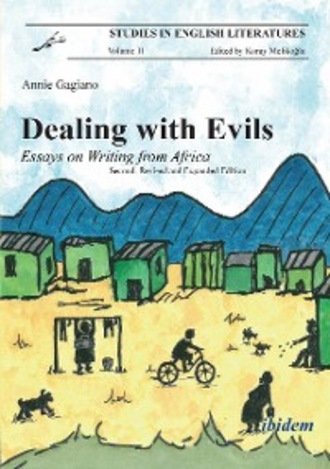
Полная версия
Dealing with Evils.
As this space is controlled institutionally, some works are legitimated and are placed within a historical genealogy while others are ignored or suppressed. This historicisation, however, is not based on the nature of the work but on the racial, ethnic or cultural background of the artist; which thus excludes the modernist or avantgardist work of artists from cultures other than of European origin on the basis that modernism is ontologically a European phenomenon. In other words, the eurocentricity of modernism is constructed and maintained largely on racial grounds by which the supremacy of the white subject is maintained. (77)
There is probably a broad truth in this accusation of “Western” myopia, given how ghettoised studies of African writing, even of novels in the Europhone languages, remain. In his introduction to the essay collection Modernism/Postmodernism, the editor Peter Brooker observes that
[a] map which shows the South of England, the Eastern seaboard of North America, and which marks in Paris, Trieste, perhaps Berlin and Vienna but not Moscow, Petrograd or Milan is not an acceptable map of “the” world, but might be the map of a certain cultural mentality, and is, as it turns out, the “map” of an Anglo-American construction of modernism. The same general point applies to postmodernism. However internally different its main versions, their common geography stretches to the American West, Canada and Australia, and until recently would show little else, even of Europe, beyond Paris and Frankfurt. (4)
A brilliant avantgardist such as Marechera, after (co-)winning the fiction prize of The Guardian in Britain in 1979 for his first substantial publication, was allowed subsequently more or less to disappear from public view (see Veit-Wild, Dambudzo Marechera 185-378). His problem was certainly in part that of the category-jumper, the “unclassifiable” writer: highly sophisticated in employing postmodernist techniques, yet writing of African experiences and settings and (tout court) exemplifying the supposed paradox: an African intellectual utterly proficient in the whole gamut of “Western” cultural and academic discourse.
Marechera during the ten years of his major writing was, one might say, considered both too African for Europe and too European for Africa. His own, oft-quoted comment (in this regard) remains the most eloquent expression of dilemma: “I have been an outsider in my own biography, in my country’s history, in the world’s terrifying possibilities. It is, therefore, quite natural for me to respond with the pleasure of familiar horror to that section of European literature which reflects this” (Marechera; qtd. in Veit-Wild, Dambudzo Marechera 364).
Marechera thought of identity as “an act of faith, impossible to verify” and regretted the “paradox that modernism has been from the start identified with difficulties and, on a continent still barely literate, modernism has, therefore, been condemned as being irrelevant on African soil” (qtd. in Veit-Wild, Dambudzo Marechera 370).
Marechera noted approvingly Achebe’s use of a Yeats quotation in titling Things Fall Apart

